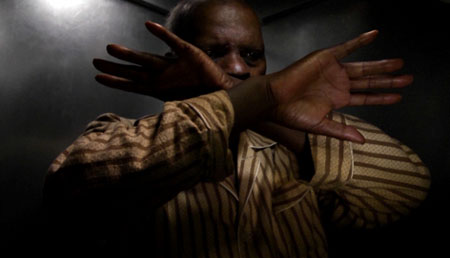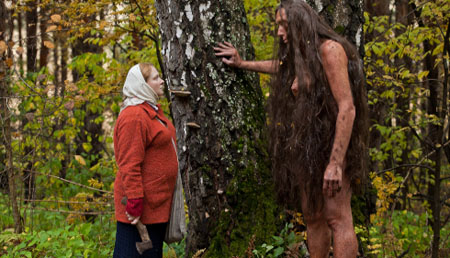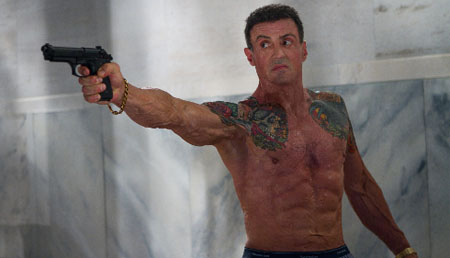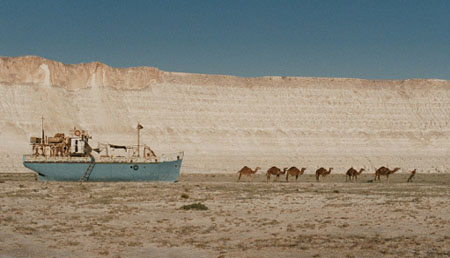Larry Clark’s Marfa Girl (see our roundup) has won Golden Marc’Aurelio for Best Film at the 7th Rome Film Festival. The International Jury, chaired by Jeff Nichols, who’s joined by Timur Bekmambetov, Valentina Cervi, Edgardo Cozarinsky, Chris Fujiwara, Leila Hatami and P.J.Hogan, has also presented these awards:
Best Director: Paolo Franchi for E la chiamano estate; the film’s also scored a Best Actress award for Isabella Ferrari.
Special Jury Prize: Alì ha gli occhi azzurri by Claudio Giovannesi.
Best Actor: Jérémie Elkaïm for his performance in Main dans la main (Hand in Hand). Lee Marshall in Screen: “The reigning monarch of French screwball indie rom-coms, Valérie Donzetti charms more than she delights with her follow-up to the remarkable Declaration of War… Featuring a brace of immensely enjoyable performances, not least by talented comedienne Valérie Lemercier and Donzelli’s former partner (and co-scripter) Jérémie Elkaïm as an unlikely couple from different sides of the tracks who become literally inseparable, Hand in Hand fails quite to deliver on its exhilaratingly madcap first act.” More from Jordan Mintzer (Hollywood Reporter) and Boyd van Hoeij (Variety). Update, 11/18: Jessica Kiang finds that “the film bubbles along nicely, with our two appealing leads bringing nuance to an idea that in the wrong hands could have become cutesy.”
Best Emerging Actor or Actress: Marilyne Fontaine for Un enfant de toi. Jordan Mintzer in the Hollywood Reporter: “A mildly involving drama where two guys and a girl spend a lot more time talking about sex than actually doing it, You, Me and Us is a minor addition to the otherwise admirable filmography of cineaste Jacques Doillon. Starring the belle It-girl Lou Doillon as a young mother caught between her former lover and current boyfriend, this overextended and rather self-serious gabfest is French to a fault.”
Best Technical Contribution: Arnau Valls Colomer, for the cinematography in Enrique Rivero’s Mai morire.
Best Screenplay: Noah Harpster and Micah Fitzerman-Blue for The Motel Life. Gabe and Alan Polsky’s debut, “based on the well-received novel of the same name by Willy Vlautin,” notes Jessica Kiang at the Playlist, is “familiar in its downbeat, disenfranchised Americana setting and even some of its themes: familial love, redemption and the fragility of hope in the face of ill-starred circumstance. But while it doesn’t reinvent the wheel, or revolutionize the genre, it achieves its modest ambitions affectingly well, in no small part due to a clutch of cherishable performances, especially from leads Emile Hirsch and Stephen Dorff, as brothers Frank and Jerry Lee.” More from Deborah Young in the Hollywood Reporter. The Motel Life has also won the BNL Audience Award for Best Film.
The International Jury for the CinemaXXI Competition, chaired by Douglas Gordon (further members: Hans Hurch, Ed Lachman, Andrea Lissoni, and Emily Jacir), has announced these awards:
CinemaXXI Award (for feature-length films): Avanti Popolo by Michael Wahrmann.
Special Jury Prize – CinemaXXI (for feature-length films): Picas by Laila Pakalnina.
CinemaXXI Award for Short and Medium Films: Panihida by Ana-Felicia Scutelnicu.
The Prospettive Italia Jury, chaired by Francesco Bruni and composed of Babak Karimi, Anna Negri, Stefano Savona and Zhao Tao, presents:
Prospettive Award for Best Feature Film: Cosimo e Nicole by Francesco Amato.
Prospettive Award for Best Documentary: Pezzi by Luca Ferrari.
Prospettive Award for Best Short Film: Il gatto del Maine by Antonello Schioppa.
Special mentions: Cosimo Cinieri and, in memory of Anna Orso, for their performances in Piero Messina’s La prima legge di Newton.
Another International Jury, this one chaired by Matthew Modine and composed of Laura Amelia Guzmán, Stefania Rocca, Alice Rohrwacher and Tanya Seghatchian, has conferred the following:
Award for Best Debut and Second Film: Alì ha gli occhi azzurri, making that a second award for Claudio Giovannesi.
Special mention: Razzabastarda by Alessandro Gassman.
Competing for the award were the films belonging to any one of the different competitive sections of the Festival: Competition, CinemaXXI, Prospettive Italia and the independent and parallel sidebar Alice nella città. Earlier today, the festival posted a list of “Collateral Awards” and their winners.
Marco Müller, artistic director of the Venice Film Festival from 2004 through 2011, has had just over half a year to put together his first program for Rome since he was confirmed as its new artistic director in March. All in all, it’s a varied and eye-catching lineup, and we’ve already taken a look at Johnnie To‘s Drug War, Roman Coppola’s A Glimpse Inside the Mind of Charles Swan III, Peter Greenaway‘s Goltzius and the Pelican Company, Paul Verhoeven’s Tricked, Takashi Miike‘s Lesson of the Evil, and of course, Larry Clark’s Best Film award-winner.
I want to point to reviews of a few other notable titles, beginning with Centro Histórico (Historic Center), “part of a wider project showcasing Guimarães, the founding city of Portugal during its year as European capital of culture,” as Jessica Kiang notes in her review of the four shorts that make up this omnibus film: The project’s producers asked various distinctive filmmakers ‘What stories does Guimarães have to tell us?’ and then sent them on their way.” And the films are Aki Kaurismäki’s Tavern Man (she gives it a B-), Pedro Costa‘s Sweet Exorcist (D+ — yikes), Victor Erice’s Broken Windows (A-), and Manoel de Oliveira‘s The Conquered Conqueror (a flat C). In the Hollywood Reporter, Jordan Mintzer more or less agrees with her assessments and notes that “the collection will tour additional fests and museums, followed by DVD sales to world cinema enthusiasts and other completists of the directors’ vast and varied filmographies.” More from Jay Weissberg (Variety).
Deborah Young (THR): “New York indie filmmaker Amos Poe, who led the No Wave cinema movement of the 1970s, remains painfully faithful to his experimental vision in A Walk in the Park, ostensibly the dissection of what ails a sort-of schizophrenic New Yorker hooked on prescription drugs, doctors and his mother. Presumably a documentary about one Brian Fass (who is credited as a cinematographer), it contains re-enacted and fantasy scenes played by actors Michael Laurence and Dorothy Frey, which put Brian’s entire personality, if not his existence, in doubt. The confusion created by this oddball entry, injected with nonstop low-tech special effects, and the tedium generated by its structure, will assure that few outside the very dedicated are likely to see it.” More from Jessica Kiang.
Jordan Mintzer (THR) on Celestial Wives of Meadow Mari (Nebesnye Ženy Lugovykh Mari), the new one from Aleksei Fedorchenko (Silent Souls): “Picture Beasts of the Southern Wild in the snowcapped Urals, with two-dozen female characters whose names all start with the letter ‘O,’ and with enough bugged out sexcapades to earn a slot on John Waters’ DVD shelf, and you’ll get a brief idea of what’s in store.” Dan Fainaru (Screen): “Shot entirely on location in a Mari village near Ekaterinburg, with a number of professional Russian actresses joining the local inhabitants and easily catching the spirit of the place, some of the film’s 22 episodes will appear incongruous and pointless while others are both luscious and entertaining.”
“Somewhere between a sophisticated erotic thriller and a homey British TV detective drama, with a bow to modernist deconstruction thrown in, Suspension of Disbelief is sure to completely satisfy no one,” writes Deborah Young (THR). “But on the basis of its light touch, intriguing shooting and mesmerizing leads, it still counts as one of the more successful personal works from uneven Brit filmmaker Mike Figgis. The tongue-in-cheek film noir tale about the death of a beautiful twin generates sparks between German star Sebastian Koch and bewitching Dutch actress Lotte Verbeek, though surprisingly little bed-time.” Kaleem Aftab for Indiewire: “The merging of the fact and fiction in the creative process has been heavily investigated recently, most notably in the works of Charlie Kaufman and Woody Allen, but no auteur has taken quite such an academic tone as the one adopted by Figgis. The director even has the temerity to put up a definition of ‘twin’ written on screen when it’s revealed that Lotte Verbeek is playing two parts: the voluptuous Angelique and her sporty curious sister Theresa. Then comes the flashing on screen of the slogan ‘character is plot,’ condensing an F. Scott Fitzgerald quote. It’s as if Figgis is desperate for us to give him a pat on the back for being such a smartass.” More from Jay Weissberg (Variety).
“About as unreconstructed as it’s possible to get,” writes Jessica Kiang, “Walter Hill’s first feature in 10 years, Bullet to the Head, finds the veteran action director utterly mired in the tropes of the ’80s R-rated action film. And we enjoyed the hell out of it. With nothing but the Himalayan crags of Sylvester Stallone’s face to suggest the last 30 years of filmmaking ever happened, Hill has—crafted seems the wrong word—rammed together an action movie in which the plot is laughable, the quips are quippy and the action nasty—no graceful, balletic, parkour bullshit here, just guns, fists, explosives and, gloriously, axes. This is gristly, muscly action, Stallone’s aging sinews standing up remarkably well to the task of dispatching opponents fleshily against concrete, steel and marble surfaces when he’s not simply shooting them. There is absolutely nothing defensible about the movie’s leering treatment of women, or the casual racism played frequently for laughs, or even the utter nihilism of its hero, but it’s so patently unrepentant, and so oddly even-handed in having all of its characters seem mindbendingingly dumb, that it kind of gets a pass.” More from Lee Marshall (Screen), Jordan Mintzer (THR), and Jay Weissberg (Variety).
“For her third feature film after 2007’s beloved Persepolis and 2011’s Chicken with Plums, writer-director Marjane Satrapi changes it up once again with The Gang of the Jotas,” writes Jessica Kiang. “Having made the move, with her previous films, from black-and-white animation, to stylized, heavily art-directed live action, here she throws both those styles out of the window and turns in a loose, black comedy road movie that feels, for the most part, about as un-stylized as you can get. With no particularly pretty pictures to hide behind, the writing, plotting and characterization of this piece are more foregrounded than in any of her previous films. Good news, then, that while the film feels like a minor work, for the majority of its running time it’s a wickedly enjoyable caper movie in which the humor, always dark, ranges from the deadpan to the slapstick, but almost always finds its mark.”
Jordan Mintzer (THR): “Documentary filmmaker Avi Mograbi once again explores the repercussions of Israel’s short but embroiled history in Once I Entered a Garden (Nichnasti pa’am lagam), a moving demonstration of how decades of conflict have affected the lives of both Jewish and Arab residents alike, revealing them to have much more in common than their claims to the same plot of land.” It’s “an intimate portrait of the director’s long-time Palestinian comrade and teacher, poetic account of a love affair torn apart by war, and self-reflexive film-in-the-making.” More from Dan Fainaru (Screen).
Deborah Young again: “Magical realism has never looked rustier or out of touch with the world than in Waiting for the Sea, a big budget Tajikistan fable about a stubborn, half-mad captain who literally pulls his wrecked ship through the desert after a freak storm turns his fishing village into a sandy wasteland. Lacking the charm of director Bsakhtiar Khodoijnazarov’s award-winning Luna Papa, it recalls the 2007 film’s whimsy but is only sporadically engaging, perhaps because there is very little comedy in the hero’s grueling and self-punishing enterprise.” More from Dan Fainaru (Screen) and Jay Weissberg (Variety).
Jessica Kiang: “Not, in fact, the Spaghetti Western from Spain (Paella Western?) that it sounds like, A Gun in Each Hand (Una Pistola En Cada Mano)… is a contemporary comedy detailing a series of encounters in which pairs of friends, acquaintances, ex-spouses and potential lovers meet and talk and, well, that’s about it. With a logline like that, you need to be sure your script delivers. Thankfully this one, co-written by director Cesc Gay, as is his wont, does; its portrait of a group of Spanish men in their forties is by turns gently scathing, comical and bittersweet, but it never feels anything less than true.” Update, 11/18: Twitch‘s Todd Brown has the trailer.
“Mad Men meets The Artist in Populaire, a superbly crafted, finely acted but somewhat shallow retro rom-com about a young French secretary who, with the help of her highly persuasive boss, hammers her way to becoming one of the fastest typists on the planet,” writes Jordan Mintzer (THR). “This impressive debut feature from writer-director Regis Roinsard is boosted by terrific lead turns from Romain Duris and Deborah Francois (The Page Turner), as well as some stunning old-school cinematography from Michel Hazanavicius regular Guillaume Schiffman. Still, there’s something formulaic and all too overtly crowd-pleasing about this sepia-toned tale of female empowerment and lost love.” More from Kaleem Aftab (Indiewire), Jessica Kiang (Playlist), and Lee Marshall (Screen).
“The emotion that was joined to spectacle in Feng Xiaogang’s mega-blockbuster Aftershock is exchanged for generic suffering and a few big yet uninvolving fighter-jet strafings in the helmer’s Back to 1942,” writes Variety‘s Jay Weissberg. “Reportedly costing $35 million, Feng’s epic is set during the horrific Henan famine, when drought and the threat of a Japanese invasion were exacerbated by lamentable judgment from the Nationalist government. Shifting between individual suffering (performed, not felt) and extended political and business deliberations, the pic displays its budget but not its heart.” More from Dan Fainaru (Screen) and Deborah Young (THR).
“Written and directed by 12 N.Y.U. film students and produced by and starring James Franco, Tar is an odd shoe that sometimes walks and sometimes sits and waits,” writes Deborah Young (THR). “And rather uniquely, it’s based on a collection of poems, in this case written by prolific Pulitzer prize-winner C.K. Williams (born in 1936) who is played by a number of actors at various ages but most resonantly by Franco. Boasting a dream cast that includes Jessica Chastain and Mila Kunis, the film should have no trouble finding festival berths.”
Update, 11/19: For Boyd van Hoeij, writing for Indiewire, this was a “disappointing edition that many had hoped would signal a new beginning under former Venice head Marco Müller. Purely judging programming and the festival’s organization, it did not seem all that different from previous years, even though, on paper, the number of world premieres was much greater than in previous editions (over 60 in all). Clearly, though, the premiere status of films says absolutely nothing about their quality. This year’s program was again mediocre and incoherent, and the festival is still an organizational mess. On top of that, the usually starry event was very low-key when it came to red-carpet decoration, with the biggest attending star 66-year-old Sylvester Stallone, who was in town to promote, somewhat surprisingly, the most enjoyable film of the festival, Walter Hill’s Bullet to the Head. Announced high-profile guest Quentin Tarantino was conspicuous only by his absence.”
Updates, 11/20: At Filmmaker‘s new site, Kaleem Aftab argues that “to expect the former Venice Film Festival artistic director Marco Müller to transform the fortunes of Rome’s film fest within eight months of taking the job would have been unfair. The event this year was about building foundation stones for the future, shaping an event and identity that would have the film world believing that all roads lead to Rome.”
At Indiewire, Celluloid Liberation Front talks with Müller, whose “very presence at the helm of this year’s edition of the Rome Film Festival provoked a 50% increase in international accreditations.”
For news and tips throughout the day every day, follow @KeyframeDaily on Twitter and/or the RSS feed. Get Keyframe Daily in your inbox by signing in at fandor.com/daily.











